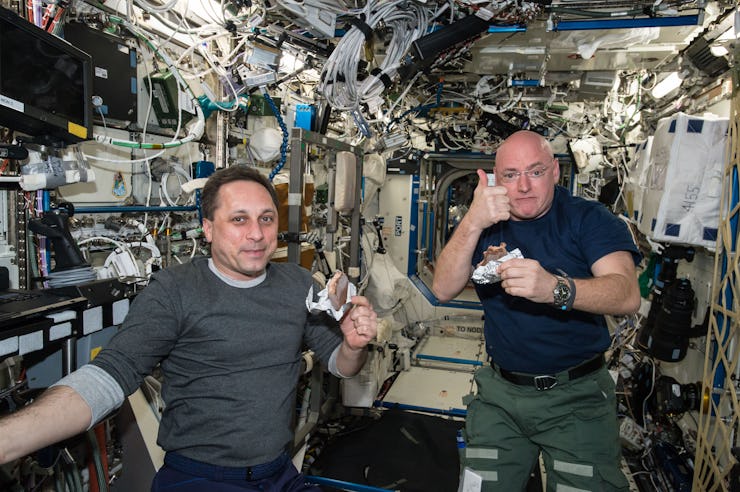For ISS Astronauts, Digestive Issues Are Surprisingly Common — And A Very Big Problem
In space, no one can hear your leaky gut.

The International Space Station (ISS) will soon retire. As humanity’s farthest outpost approaches its sunset, researchers are raking in data on how astronauts might survive in the next iterations of human spaceflight. Unfortunately, a recent study reveals there’s a long way to go before we’re ready to live long stretches off planet Earth.
In short, we can’t stomach it.
Biodata from astronauts and rodents in space are revealing that being up there significantly increases a major digestive issue called gut permeability.
Thursday’s lineup at the International Space Station Research & Development Conference in Boston included a presentation from University of Florida PhD student Oluwamayowa Akinsuyi. After looking at several datasets from NASA and the Japanese Aerospace Exploration Agency (JAXA), Akinsuyi’s team found a “substantial reduction” in the expression of genes that maintain our intestinal barrier.
NASA astronaut Scott Kelly performing a spacewalk on November 6, 2015.
“Our findings on this project underscore the critical need to develop effective countermeasures to treat gastrointestinal (GI) health during long-duration spaceflight, “Akinsuyi said in a July 20 presentation about the same work. “And also one key thing our work pointed out is that there is clearly more work that is needed to increase awareness about the problem of leaky gut during space flight.”
It Takes Guts
The human body takes a big risk when we eat. Many times a day, it’s exposed to potentially harmful substances that hitch a ride alongside the good stuff in food and medicine. The gastrointestinal tract operates in a delicately robust fashion consisting of two layers to transport water and nutrients into the rest of the body, secrete other material out, and, all the while, keep out harmful substances like bacteria and toxins.
When the GI tract is in a good groove, that’s intestinal homeostasis. Without homeostasis, when the gut barrier is too permeable, inflammation and a host of diseases can appear. This is called leaky gut.
Akinsuyi analyzed five datasets from the NASA Genelab program. Genetic information from astronauts and rodents that were flown into space seems to suggest that spaceflight alters the gene expression that prevents leaky gut.
The astronauts and rodents experienced an imbalance in their gut microbiome, which is associated with increased intestinal pathogens and decreased beneficial microbes.
“Osteoporosis ... can be worsened by gut microbes and also a weak gut barrier.”
A lack of intestinal integrity could trigger disorders like inflammatory bowel disease, nonalcoholic fatty liver disease, cirrhosis and bone loss.
“Osteoporosis is a big problem astronauts experience during spaceflight, and this can be worsened by gut microbes and also a weak gut barrier,” according to Akinsuyi. The inflammatory response from leaky gut can “ultimately alter bone remodeling and result in bone loss,” he added.
Spaceflight is previously known to have an effect on gene expression and bone loss. If astronaut tummies are also connected to these phenomena, research into long-duration missions may have to continue in the few years that the ISS has left in orbit.